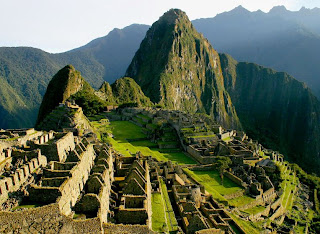Polo starts the dialogue by saying "Perhaps the terraces of this garden overlook only the lake of our mind." (117) Then Khan responds "And however far our troubled enterprises as warriors and merchants may take us, we both harbor within ourselves this silent shade, this conversation of pauses, this everything that is always the same." (117) If they can't even assimilate their reality, this means that they are simply lost in their own existence. Their reality is so plain, but at the same time so ingenious. This ingenuity only happens inside their heads, while their actual life is not more than a misery.
 Then Polo talks about another theory. "Unless the opposite hypothesis is correct: that those who strive in camps and ports exist only because we two think of them, here, enclosed among these bamboo hedges, motionless since time began." (117) Here comes the idea of a powerful mind, where they build these idea that they can create a world only by imagining it. How egocentric can they be to consider such a thing? They are basically saying that they are the chiefs of the world and that they decide what to do with the lives of everyone.
Then Polo talks about another theory. "Unless the opposite hypothesis is correct: that those who strive in camps and ports exist only because we two think of them, here, enclosed among these bamboo hedges, motionless since time began." (117) Here comes the idea of a powerful mind, where they build these idea that they can create a world only by imagining it. How egocentric can they be to consider such a thing? They are basically saying that they are the chiefs of the world and that they decide what to do with the lives of everyone.Finally, they both reject this hypothesis and conclude that they are the ones who exist. Khan says: "We have proved that if we were here, we would not be." (118) Then Polo concludes: "And here, in fact, we are." (118) This reminds me to Shakespeare's poem "To be or not to be."
The poem says:
" To be, or not to be, that is the question:
Whether 'tis Nobler in the mind to suffer
The Slings and Arrows of outrageous Fortune,
Or to take Arms against a Sea of troubles,
And by opposing end them: to die, to sleep
No more; and by sleep, to say we end
the heart-ache, and the thousand Natural shocks
that flesh is heir to?"
 When we think further, we start questioning our own existence. What is really the essence of our existence, do we really understand our presence? Are we conscious of it?
When we think further, we start questioning our own existence. What is really the essence of our existence, do we really understand our presence? Are we conscious of it?In this case, Polo and Khan don't know if they really are or if they are not. Both o these characters seem to have a subconscious mind, making them even more realistic to the reader. In Hamlet, the character questions whether it is better "to be, or not to be, which implicates his own suicide. He is doubting wether to kill himself or not. In this case, Polo and Khan are doubting wether their reality is true or false.








